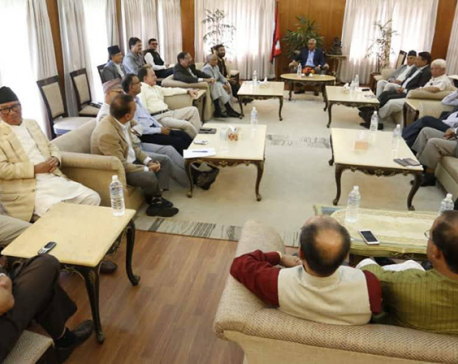
OR
Disputes over constituencies mar ‘democratic’ alliance talks
Published On: October 9, 2017 06:07 AM NPT By: Roshan Sedhai
KATHMANDU, Oct 8: Efforts by the Nepali Congress (NC) to form a ‘democratic’ alliance seem to be going nowhere mainly due to disputes over the sharing of constituencies in the provincial and parliamentary elections slated for November 26 and December 7.
The democratic alliance is an NC-led initiative to form a pre-poll alliance to counter the newly-formed left alliance comprising the CPN-UML, CPN (Maoist Center) and Naya Shakti Nepal.
In a meeting held at Baluwatar last Wednesday, a day after the announcement of the left alliance, five smaller parties had agreed to join hands with the NC to forge an alliance which they said would counterbalance the left and champion democratic values. The meeting had even formed a seven-member panel to hammer out a deal on seat distribution and other issues.
The panel led by NC Vice President Bimalendra Nidhi includes representatives from the Rastriya Janata Party Nepal (RJPN), Nepal Loktantrik Forum, the Kamal Thapa-led Rastriya Prajatantra Party and the Pashupati Shumsher Rana-led Rastriya Prajatantra Party (Prajatantrik) and the Sanghiya Samajbadi Forum Nepal led by Upendra Yadav.
But cross-party interlocutors said the panel has failed to make any progress with smaller parties driving a hard bargain on the negotiation table. The situation, according to the leaders, is such that there would be nothing left for NC if it allots the constituencies as demanded by the smaller parties. They said that the five fringe parties have demanded more than 60 constituencies out of the 165 under the first-past-the-post category. The number is higher than the number of local units won by the parties in the latest local polls.
“The bigger problem is in the allotment of the constituencies as each party is claiming stake on the constituencies they are more or less certain of winning. This is hindering consensus,” said Ram Janam Chaudhary, who is involved in the negotiation process.
In rounds of meeting with NC, leaders of Rastriya Janata Party Nepal (RJPN) and Federal Socialist Forum Nepal (FSFN), which have agreed to field consensus candidates, have claimed stake on more than two-thirds of constituencies in Province 2 which happens to be the key support base of both NC and the regional parties. The party had also demanded “ridiculously high” number of constituencies in the western plains despite its relatively lower presence there. Similarly, the RPP led by Kamal Thapa has demanded more than 20 seats in the pre-poll arrangement.
There would be nothing left for NC if it allots the constituencies as demanded by the smaller parties.
One of the main reasons the fringe parties are driving a hard bargain is because they believe that the proposed alliance will primarily serve NC’s strategic interests. The inflexible stance of the smaller parties has put the grand old party in a fix. NC leadership appears to be neither in a position to irk its small allies nor give what they are demanding. There will be little left for the NC if it gives the numbers of seats demanded by the small parties. Not accommodating these parties, on the other hand, could push them into UML’s lap.
A meeting between NC and RJPN leaders held at Baluwatar on Sunday ended inconclusively after the latter refused to budge from its stance. The meeting, however, decided to solve the issue of seat adjustment at the highest level, RJPN leader Rajendra Mahato said.
While NC leaders remain hopeful of a last minute deal, leaders of the fringe parties said that the possibility of a pre-poll democratic alliance is getting slimmer.
“A pre-poll alliance looks unlikely under the existing circumstances. But there is possibility of a loose alliance,” said FSFN Chairman Upendra Yadav. Yadav said that FSFN and RJPN would field consensus candidates irrespective of the outcome of the ongoing negotiation with the NC.
You May Like This

Left Alliance outweigh Democratic Alliance at Baitadi
KATHMANDU, Dec 8: Candidates of Left Alliance have outweighed democratic alliance candidates in both House of Representatives and Provincial Assembly... Read More...

Democratic alliance essential to check leftist alliance: Leaders
KATHMANDU, Oct 5: Leaders from various political parties have said the alliance among the democratic forces was essential to check... Read More...

NC holding talks with various parties for democratic alliance
KATHMANDU, Oct 3: A day after CPN-UML, CPN (Maoist Center) and Naya Shakti party formed a broader leftist alliance and... Read More...




Just In
- Tattva Farms rejuvenates Nepali kitchens with flavored jaggery
- Evidence-Based Policy Making in Nepal: Challenges and the Way Forward
- Insurers stop settling insurance claims after they fail to get subsidies from government
- Nepal-Qatar Relations: Prioritize promoting interests of Nepali migrant workers
- Health ministry to conduct ‘search and vaccinate’ campaign on May 13
- Indian customs releases trucks carrying Nepali tea, halted across Kakarbhitta
- Silent period for by-election to begin from midnight
- SC issues short-term interim order to govt and TU not to take immediate action against TU legal advisor Khanal













Leave A Comment